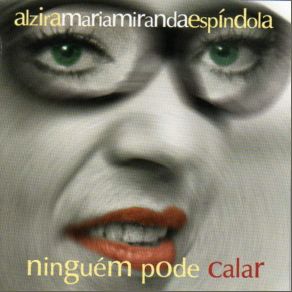Ninguém Pode Calar / Ninguem Pode Calar
Download links and information about Ninguém Pode Calar / Ninguem Pode Calar by Alzira Espindola. This album was released in 2000 and it belongs to Latin genres. It contains 12 tracks with total duration of 45:45 minutes.

|
|
|---|---|
| Artist: | Alzira Espindola |
| Release date: | 2000 |
| Genre: | Latin |
| Tracks: | 12 |
| Duration: | 45:45 |
| Buy it NOW at: | |
| Buy on iTunes $9.99 | |
Tracks
[Edit]| No. | Title | Length |
|---|---|---|
| 1. | Voltei | 3:40 |
| 2. | Meu Mundo Caiu | 3:44 |
| 3. | Bom Dia Tristeza | 4:03 |
| 4. | Adeus | 4:24 |
| 5. | Chão de Estrelas | 0:32 |
| 6. | Tarde Triste | 5:01 |
| 7. | O Que | 3:39 |
| 8. | Felicidade Infeliz | 3:12 |
| 9. | Resposta | 3:35 |
| 10. | Ouça | 4:40 |
| 11. | Diplomacia | 3:16 |
| 12. | Quem Quiser Encontrar o Amor | 5:59 |
Details
[Edit]Alzira Espíndola devoted this album to a very personal revisitation of the work of the mythical singer/composer Maysa. One of the most important proponents of the fossa (or dor-de-cotovelo) genre, characterized by deep love pains and smoky bars, Maysa's unforgettable interpretations have to deal with weighty, grandiloquent orchestral arrangements. Alzira Espindola's concept was to focus on Maysa's compositional work (which is already new per se, as she is celebrated mainly as a singer), preserving lyrics and melodies; but the arrangements are completely different. Expressing the inner truth of this decades-old sul-mato-grossense (from the border of Paraguay), the economic acoustic guitars and discreet bass/percussion that form the core of the accompaniment evidences an urban atmosphere with reflexes of folk music, where the rock feel also is present. Espindola profited from her age, which helped her to develop her own voice, now especially delicate and profound, freeing her of the influence of her famous sister, Tetê Espíndola. While Tetê Espíndola's virtuosic skills are unquestionable, Alzira Espindola now recognizes that her tessitura is lower, and the avoidance of any extra-musical effects make this a highly recommended album for those who are looking for delicate, warm, almost vibrato-free new renditions for some pieces of Maysa's repertory. This includes the emblematic "Ouça," "Voltei," and "Meu Mundo Caiu," and the non-originals "Bom Dia, Tristeza" by Adoniran Barbosa/Vinícius de Moraes and "Quem Quiser Encontrar o Amor" by Carlos Lyra/Geraldo Vandré — the latter in one of the rare re-recordings of a Vandré tune, as he is reluctant to give his permission for that).